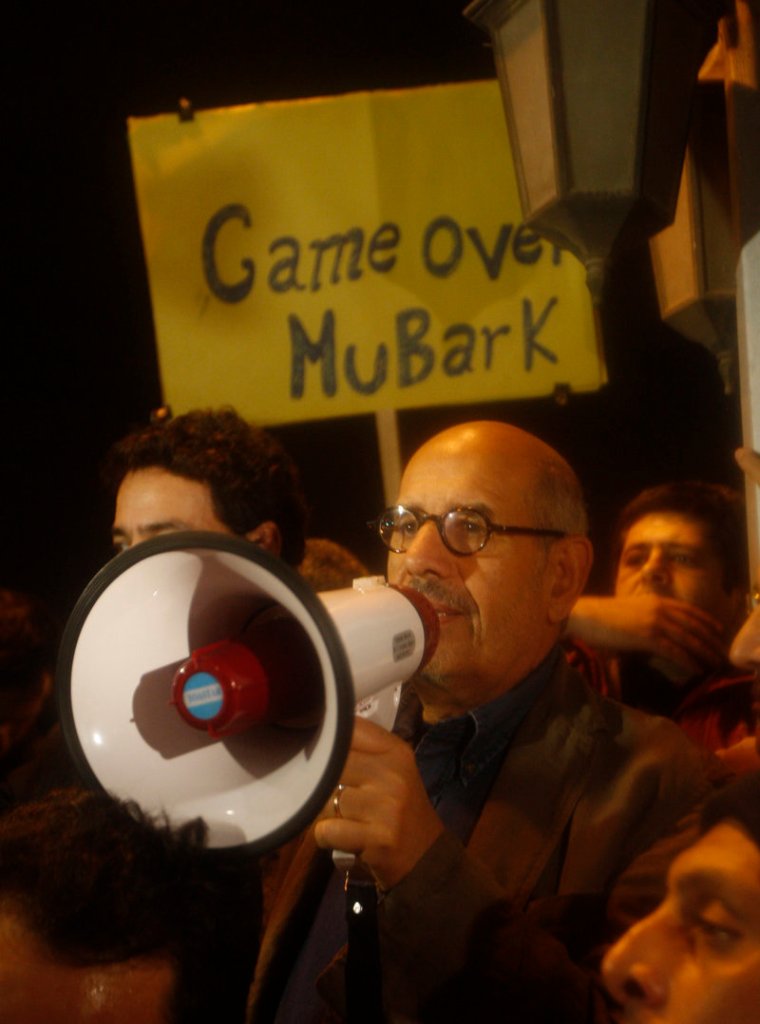CAIRO – The Egyptian military moved on multiple fronts Sunday to display its strength and consolidate support, as factions within the government and on the street vied for control of this strategically vital nation at the heart of the Arab world.
With pro-democracy demonstrators demanding the resignation of President Hosni Mubarak for a sixth day, the military sent conflicting signals about where its loyalties lie. On the streets, soldiers curried favor with demonstrators. But F-16 fighter jets streaked through the sky, and in images on state-run television, the nation’s military brass appeared alongside the embattled president.
All across Egypt, troops in tanks fanned out to work with residents in chasing down marauding bands of knife-wielding thugs and to impose some semblance of order after the nearly complete disappearance of uniformed Egyptian police.
Egyptians of all political persuasions accused the much-maligned police of being behind a campaign to terrorize the country — either by perpetrating the violence themselves or by standing aside and allowing it to occur.
As hatred toward the police grew, so did admiration for the army — which may be the intent of Egypt’s security establishment as it struggles to find a way out of the crisis.
The apparently contradictory signals from the army suggested that the question of who will rule Egypt remains very much in doubt nearly a week after protesters turned this country’s political universe upside down with a mass mobilization that appears to be growing stronger.
Opposition leaders gathered Sunday to try to organize their efforts, and they tentatively settled on pro-democracy activist and Nobel laureate Mohamed ElBaradei as their interim leader in any negotiations with the government.
ElBaradei told reporters that he has the “popular and political support” necessary to begin the process of forming a unity government, and that he would be seeking contact with the army to discuss a political transition.
But ElBaradei received only a lukewarm reception when he spoke later Sunday at Tahrir Square, the capital city’s central plaza, and protesters said they would rather continue to operate as a diffuse people’s movement than as an organized opposition.
Thousands of protesters who marched peacefully under military protection vowed to stay in the square until Mubarak resigns from office.
At one point in the early afternoon, protesters and soldiers worked together to beat back two Interior Ministry vehicles that attempted to enter the site.
An army commander then scaled his tank and announced to the crowd that the Interior Ministry had deployed thousands of armed men who were bent on sowing chaos in Egypt. The army, he said, “would stand with the people.” The commander, dressed in camouflage battle fatigues, was cheered by the crowd and kissed on the cheek by demonstrators, who chanted, “The army and the people are one!”
That sentiment, however, was not matched by images broadcast on state television that featured the 82-year-old Mubarak alongside the military and intelligence chiefs, as well as the defense minister. In a possible indication of an ongoing power struggle, the interior minister did not appear to be present.
The army is believed to have the power to topple Mubarak if it chooses, but so far it has not done so, which may mean its gestures of solidarity with the protesters are meant only to placate the movement as the president engineers a succession plan.
Protesters on Sunday held aloft a banner reading, “The army must choose between Egypt and Mubarak.”
Protesters have been resolute in insisting they will not accept Mubarak or any other member of the president’s inner circle as their leader. The demonstrators, who proudly assert that they answer to no individual or organization, have demanded fair and free national elections to choose Egypt’s president.
Egyptians have never had such a choice, and a move toward democracy in this nation of 80 million would have deep reverberations across a region traditionally led by unelected autocrats.
Protesters on Sunday called on the United States to openly embrace their cause, with many saying they believed that Mubarak’s ability to stay in office would hinge on whether he continues to enjoy backing from Washington.
“We want to be like America. We want to choose our president,” said Mohammed el-Rady, a 32-year-old accountant who works for the government but was nonetheless on the streets protesting against the president. “This movement is not about Islam. It’s not about religion. It’s about people who have been suffering for 30 years who want democracy.”
El-Rady, like many Egyptians interviewed Sunday, said he had seen police officers who had shed their uniforms engage in looting and vandalism overnight.
At a jail outside Cairo, thousands of prisoners escaped after police abandoned their posts, according to multiple reports. Late Sunday, state television announced that police would be back on the streets today.
Send questions/comments to the editors.



Success. Please wait for the page to reload. If the page does not reload within 5 seconds, please refresh the page.
Enter your email and password to access comments.
Hi, to comment on stories you must . This profile is in addition to your subscription and website login.
Already have a commenting profile? .
Invalid username/password.
Please check your email to confirm and complete your registration.
Only subscribers are eligible to post comments. Please subscribe or login first for digital access. Here’s why.
Use the form below to reset your password. When you've submitted your account email, we will send an email with a reset code.